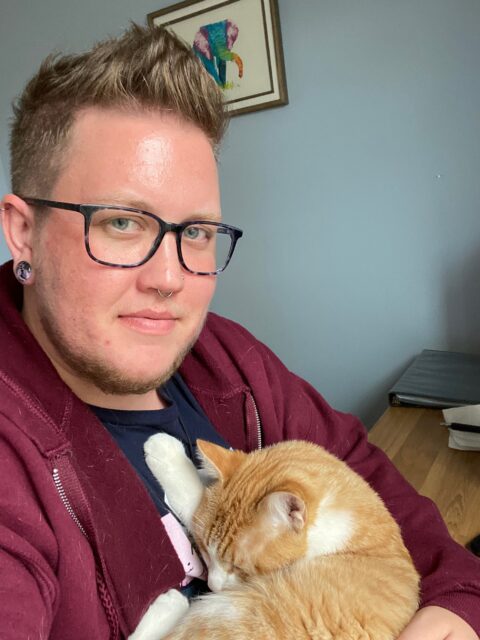When Nipun Sehgal came out as gay, he almost didn’t believe it had happened.
“When I woke up the next morning, I thought to myself, Did that really happen or did I dream that?”
The previous night, he sat together with his mother, father and brother. The family had gathered to celebrate his brother’s engagement. His parents joked about when Sehgal would settle down with a nice girl and give them grandkids. That’s when his brother said, “Just tell them.”
“I don’t know how they knew the perfect words to say,” Sehgal recalls. “But they really focused on how much they loved me. My dad even said he wished I had told him sooner. It was pretty perfect.”
Buoyed by the confidence of a loving family, Sehgal finished his MBA and joined Dell Technologies in 2018 as a pricing, MarTech and change management strategist, where he was “out from the day I stepped into the organization.”

Sehgal’s story highlights the power a positive coming-out experience can have. He shares his story to celebrate National Coming Out Day, a celebration of LGBTQ people who have the courage to live openly as their authentic selves. To celebrate this day, he points out how tech companies have been raising the bar in accepting and supporting LGBTQ professionals.
“Tech is the most progressive industry I’ve seen,” he says. “Other businesses are behind, but they are starting to see that [LGBTQ diversity] is something that people really value.”
“We still got the deal”
Sehgal and others credit Dell Technologies with leading the charge in tech for more LGBTQ visibility. After 18 years with the company, Kelly McKenzie, a global end-to-end experience lead, came out at Dell Technologies as a transgender woman last October. In her tenure, she recalls only one negative experience about her gender identity—and it was with a customer.
After coming out at work and to her customers, she joined a conference call in which the customer lead asked her about “her whole ‘trannie’ experience.” The Dell Technologies senior account executive immediately ended the call after the offensive comment and contacted McKenzie to ask her if she was okay.
“This was millions of dollars,” she says. “This was a bread-and-butter deal. And the executive didn’t try to assuage me just to keep the deal going. He made it clear that this was unacceptable.”
When you see LGBTQ people not just succeed but thrive, when you see them climbing the ladder of opportunities, that’s when you know a company is putting its money where its mouth is.
—Kelly McKenzie, global end-to-end experience lead, Dell Technologies
McKenzie says that phone call illustrates Dell Technologies’ current culture. “That’s why we come to work here. Just the belief system—just knowing that we are expected to do the right thing, even with millions on the line.”
“And,” McKenzie adds, “we still got the deal.”
What separates Dell Technologies’ culture from other corporations, for McKenzie, is the visible success of LGBTQ employees.
“Culture drives investments, and investments drive the attitude. When you see LGBTQ people not just succeed but thrive, when you see them climbing the ladder of opportunities, that’s when you know a company is putting its money where its mouth is,” says McKenzie.
How companies can do more
Despite these moving stories, Sehgal, McKenzie and others admit there is further to go.
“Because of our progress, the barriers that still exist are very nuanced,” Sehgal says. “The barriers are still there, yet they’ve become more subtle.”
Sehgal acknowledges that large corporations may have strong policies of inclusiveness, but the size of today’s tech giants still makes uniform enforcement a challenge. “Like any industry, different groups can be on different pages in the same book,” he says. “I still feel myself wondering, from meeting to meeting, Can I share this part of myself here or will my colleagues take it in a weird way?”

Jey Sluys, a senior analyst in accounts services management, believes tech companies can do more to communicate the protections LGBTQ workers have won recently. Sluys, who came out as transgender and nonbinary at Dell Technologies in 2019, two years after joining the company, calls this lack of knowledge “the biggest thing holding LGBTQ people back from coming out.”
“Even if it may or may not feel like the company’s job, it’s helpful,” they say. “Plenty of queer people think about coming out with questions like, Can I afford that experience? Can I afford to be fired? We need to know that more than just company policy is protecting us.”
Sluys is referring to Bostock v. Clayton County, the 2019 Supreme Court decision that included sexual orientation and gender identity under federal employment discrimination protections. “Communicating this protection is so helpful,” they say. “The news is so negative today that we are naturally skeptical of the positive. Companies can be part of spreading the message.”
McKenzie believes that tech companies can do more to expand LGBTQ acceptance through their international footprint, especially in countries where queer people are repressed.
“We need more resources where the culture and our goals conflict,” she says. “We can’t afford to take our foot off the gas. If we invest in respect, we’ll see customers try to pay it back to us.”
“Still the same person”
While more work remains, these LGBTQ tech employees are grateful for their coming-out journeys and how Dell Technologies has continued to treat them as people, first.
“I didn’t come out to be an example, but, along the way, I’ve been invited to be visible as an LGBTQ person,” McKenzie shares. “And I say: Let’s take care of our customers. Be aware of your brand, and be really good at what you do. Let’s make that the issue.”
Despite my gender identity, I’m still just a person, working, trying to pay my bills and feed my cat. It meant everything when I came out to feel like nothing had changed—that I was still the same person but validated in all that I am.
—Jey Sluys, senior analyst, Dell Technologies
Sehgal emphasizes that companies with the best practices learn to balance validation and acceptance. “This is my day-to-day life. I don’t want my managers to think of me any differently. You shouldn’t be totally defined by one aspect of your life, especially in your professional career.”
“Despite my gender identity, I’m still just a person, working, trying to pay my bills and feed my cat,” adds Sluys. “It meant everything when I came out to feel like nothing had changed—that I was still the same person but validated in all that I am.”
Lead photo courtesy of Johannes Krupinski/Unsplash

